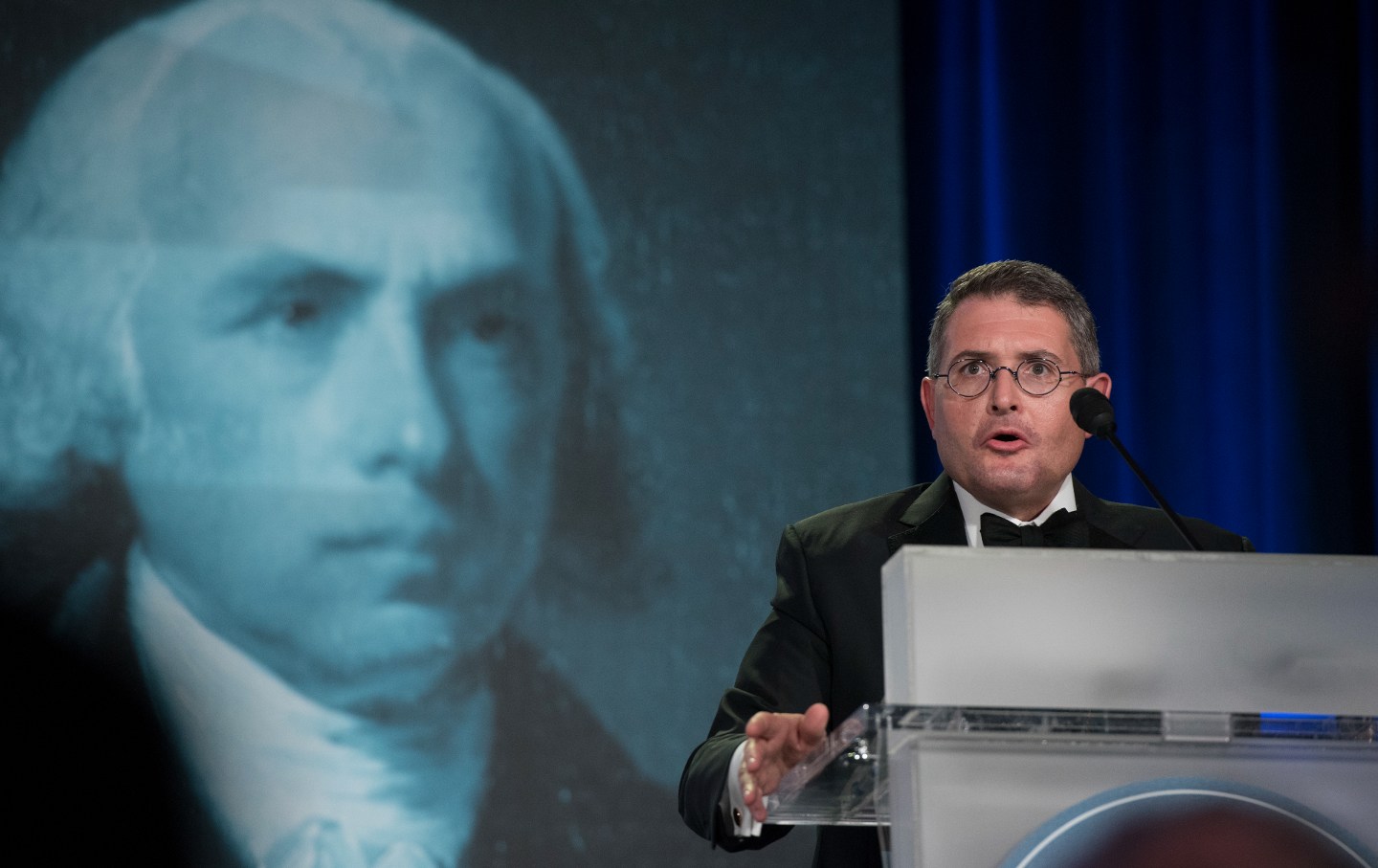How Leonard Leo Weaponized the Courts Against Democracy
The Federalist Society uses billionaire funds and right-wing ideology to remake the law.

Leonard Leo, the executive vice president of the Federalist Society, speaks at the 2017 National Lawyers Convention in Washington, D.C., on November 16, 2017.
(Sait Serkan Gurbuz / AP)The Supreme Court, dominated for decades by Republican nominees, is systematically undermining democracy, most notably in cases like Shelby County v. Holder, a 2013 decision that hamstrung key parts of the Voting Rights Act. A new case now under review, Alexander v. South Carolina State Conference of the NAACP, suggests that the Supreme Court’s war on democracy is about to escalate. As Vox reports, the court’s majority “spent Wednesday morning seemingly hunting for a reason to uphold a South Carolina congressional map that everyone agrees was gerrymandered to benefit the Republican Party.”
Under law, the courts have a mandate to overturn racial gerrymandering—but not partisan gerrymandering. The case in South Carolina involves a clear case of racial gerrymandering done for partisan reasons. Based on the questions asked by the conservative judges for the majority, it seems likely that once again laws protecting the voting rights of Black citizens will be restricted.
Beyond voting rights, the courts have been a bastion of reactionary policymaking, much more effective in advancing the domestic agenda of the right than the often gridlocked Congress or even the presidency (under the erratic leadership of figures like George W. Bush and Donald Trump).
On crucial issues like abortion, LGBTQ rights, gun control, union rights, student loan relief, healthcare, and the functioning of the administrative state, the court consistently leans toward the hard right. The one person who bears the most responsibility for this is Leonard Leo, a long-time majordomo of the Federalist Society who is also in charge of a $1.6 billion nonprofit called the Marble Freedom Trust, tasked with promoting conservative and libertarian values. The news organization ProPublica has in recent months specialized in keeping track of the legal network Leo has created over the last few decades, with special attention to his services as a matchmaker helping Supreme Court justices like Clarence Thomas and Samuel Alito forge social ties with billionaires like Harlan Crow, Paul Singer, and Charles Koch.
Revelations about a tight social network between Supreme Court justices and billionaires has, of course, raised issues about conflicts of interest. While the potential corruption of these relationships is an important concern, these social networks are about more than just individual self-enrichment. They are about the creation of a coherent right-wing ideological network in the courts, not just at the highest level but also including the lower courts and district attorneys as well as Republican lawmakers.
Now, ProPublica—in a report written by Andy Kroll, Andrea Bernstein, and Ilya Marritz—shows how this ideological network actually came together, by surveying the career of Leonard Leo. Born in 1965, Leo rose through the ranks of movement conservatism, imbibing the peculiar legal doctrine of originalism in the service of religious traditionalism and capitalism. As an intern in Washington in 1985, he was particularly inspired by a speech on behalf of originalism by Ronald Reagan’s attorney general, Ed Meese. According to Meese and Robert Bork, Reagan’s failed Supreme Court justice, originalism claimed to be a pro-democracy theory, one that would wrest power away from overweening activist judges and return it to lawmakers. In the speech that Leo credits with having an “enormous impact on my thinking,” Meese said, “There is danger in seeing the Constitution as an empty vessel into which each generation may pour its passion and prejudice.”
Another crucial turning point was the decision Planned Parenthood v. Casey (1992), which limited parts of Roe v. Wade (1973) but affirmed the core constitutional right to abortion. A remarkable fact of this decision is that all five justices who upheld the right to abortion were Republican nominees (Sandra Day O’Connor, Anthony Kennedy, David Souter, Harry Blackmun, and John P. Stevens). In fact, three authors of the decision (O’Connor, Kennedy, and Souter) were all nominated by either Ronald Reagan or George H.W. Bush, presidents who had courted the religious right far more than had previous Republican presidents.
Casey was seen by Leo and other movement conservatives as a great betrayal—proof that establishment Republicans could not be trusted with the great mission of overturning Roe. The danger was that mainstream Republican jurists, once elevated to high positions, tended to go soft on social liberalism (even as they remained committed to a pro–big business agenda). By this analysis, typical GOP nominees were too much influenced by the ambient liberal culture of law school and the Washington elite.
Based on this assessment, the goal became to nominate not just Republican judges but the right sort of Republican judges, indoctrinated at an early age in conservative principles and who, in later life, would have every incentive—in terms of both financial advancement and the comforts of belonging to a tightly knit and financially secure community—to stay loyal to the cause.
As ProPublica notes, the right
needed to cultivate nominees who would not only start out loyal to the cause but remain stalwart through all countervailing mainstream pressures. Leo and his allies concluded that they needed to identify candidates while they were young and nurture them throughout their careers. What they needed was a pipeline.
That meant finding young, talented minds when they were still in law school, advancing their careers, supporting them after setbacks and insulating them from ideological drift.
The Federalist Society, formed in 1982, was the perfect vehicle for this project of forging a right-wing legal cadre and funneling it into the legal system. Leo joined the Federalist Society in 1986, forming a chapter of the group at Cornell where he was studying law. As he rose in the ranks, Leo was an important player in the political campaigns to win Senate approval for Supreme Court justices such as Clarence Thomas, John Roberts, and Samuel Alito. During the Bush administration, when the Department of Justice wanted to “launder and distribute” a white paper in support of a contentious nominee, they turned to Leo. Viet Dinh, a Department of Justice official who was also a prominent member of the Federalist Society, e-mailed, ”Tell len leo [sic] I need this distributed asap.” The Federalist Society was thus organically tied to the Republican Party. When nominees ran into headwinds, Leo would lead the charge with media campaigns to rally support.
By 2016, the role of the Federalist Society as the essential gatekeeper of Republican judicial nominees was recognized by presidential candidate Trump, who promised the right-wing base, “We’re going to have great judges, conservative, all picked by the Federalist Society.”
The network Leo brought together comprises three cords: the GOP (which needed conservative judges), the legal profession (where young lawyers were hungry for a pathway to judges), and plutocratic donors (eager for judges that supported plutocracy and right-wing politics).
Popular
“swipe left below to view more authors”Swipe →Money was a crucial component of this network. George Conway, a former Republican who had been active in the Federalist Society, told ProPublica, “There was always a concern that Scalia or Thomas would say, ‘Fuck it,’ and quit the job and go make way more money at Jones Day [a big law firm] or somewhere else. Part of what Leonard does is he tries to keep them happy so they stay on the job.” This explains the luxurious lifestyle enjoyed by right-wing judges as they vacation and cavort with robber barons such as Harlan Crow and Paul Singer. The judges get to enjoy the lifestyle of the 1 percent despite earning a government salary.
While the Supreme Court is the big prize, the conservative legal movement that Leo forged worked to reshape lower courts as well as state courts, helping to promote not just right-wing judges but also district attorneys. Sometimes the lobbying was demagogic. Politico reports,
Leo became interested in Wisconsin in 2008. An incumbent state Supreme Court justice, Louis Butler, had angered the state’s largest business group with his ruling in a lead paint case. The ensuing ad campaign was contentious and expensive, featuring commercials showing Butler, who is Black, next to the picture of a sex offender who was also Black.
The racist demagoguery of that judicial race is of a piece with the way Republican jurists have so often worked to curtail voting rights. The whole claim that originalism was meant to enhance democracy has been revealed as a fraud. The same antidemocratic tendency can be seen in the way the court is working to limit president Biden’s agenda, as in the recent decision in Biden v. Nebraska overturning student debt relief—a measure that was in the Democratic Party platform when Biden won the election.
The goal was to create an ideologically committed faction that could dominate the courts and advance its agenda without democratic check. That’s the system Leonard Leo created—and it deserves to be recognized as equal to Trumpism in posing one of the greatest threats to American democracy.
More from
Jeet Heer 

Donald Trump Is the Authentic American Berserk Donald Trump Is the Authentic American Berserk
Far from being an alien interloper, the incoming president draws from homegrown authoritarianism.

No, Kamala Harris Staffers Did Not Run a “Flawless” Campaign No, Kamala Harris Staffers Did Not Run a “Flawless” Campaign
Democratic strategists are still patting themselves on the back for a catastrophic defeat.

Donald Trump’s Government of Gangsters Donald Trump’s Government of Gangsters
Who is being naïve now?

The Democrats Will Keep Losing Until They Solve Their Plutocracy Problem The Democrats Will Keep Losing Until They Solve Their Plutocracy Problem
The party’s habitual deference to big donors makes it impossible to effectively oppose Trumpism.

Only a Working-Class Party Can Challenge Donald Trump’s Corruption Only a Working-Class Party Can Challenge Donald Trump’s Corruption
GOP plutocracy thrives as long as Democrats remain beholden to Wall Street.

Biden’s Mindless Escalation Is a Final Betrayal of Ukraine Biden’s Mindless Escalation Is a Final Betrayal of Ukraine
Instead of preparing for inevitable negotiations, the outgoing president adds fuel to the fire.


